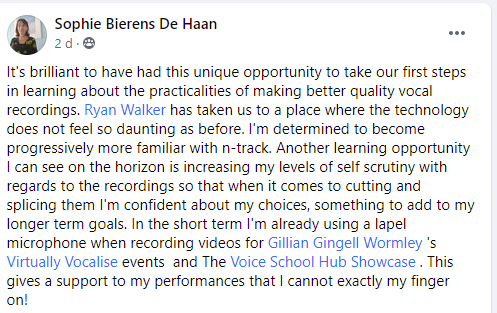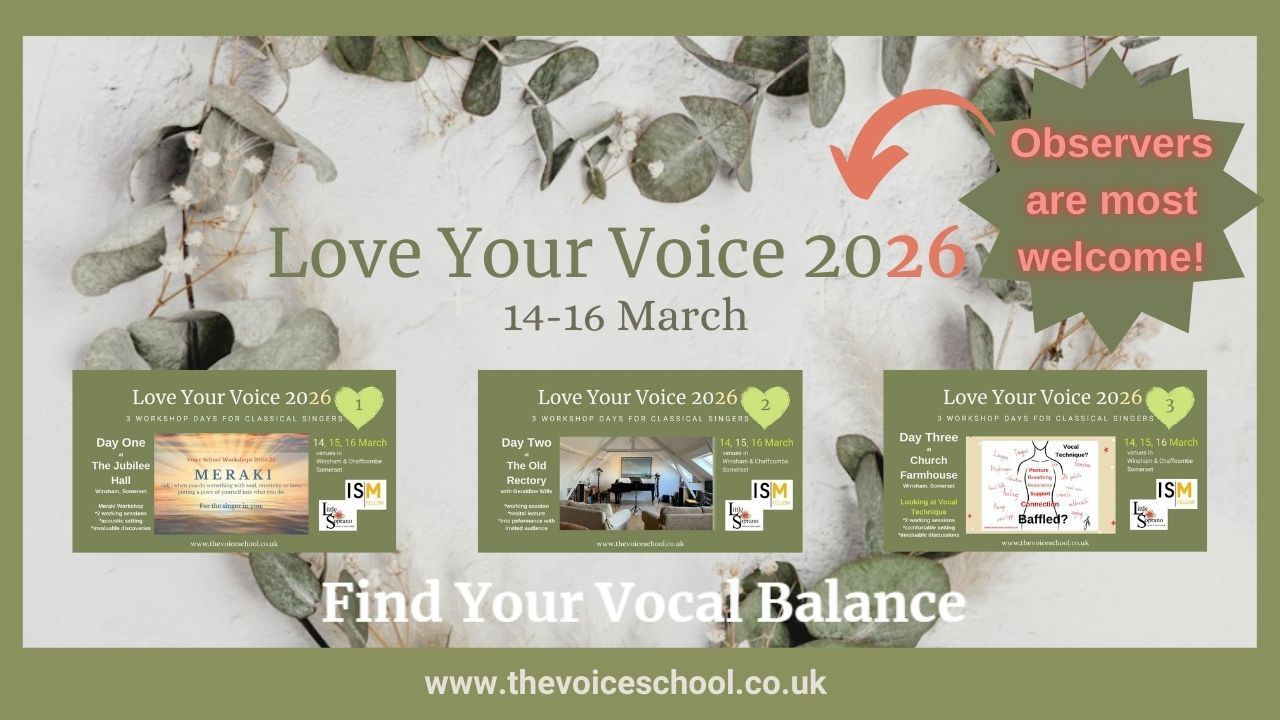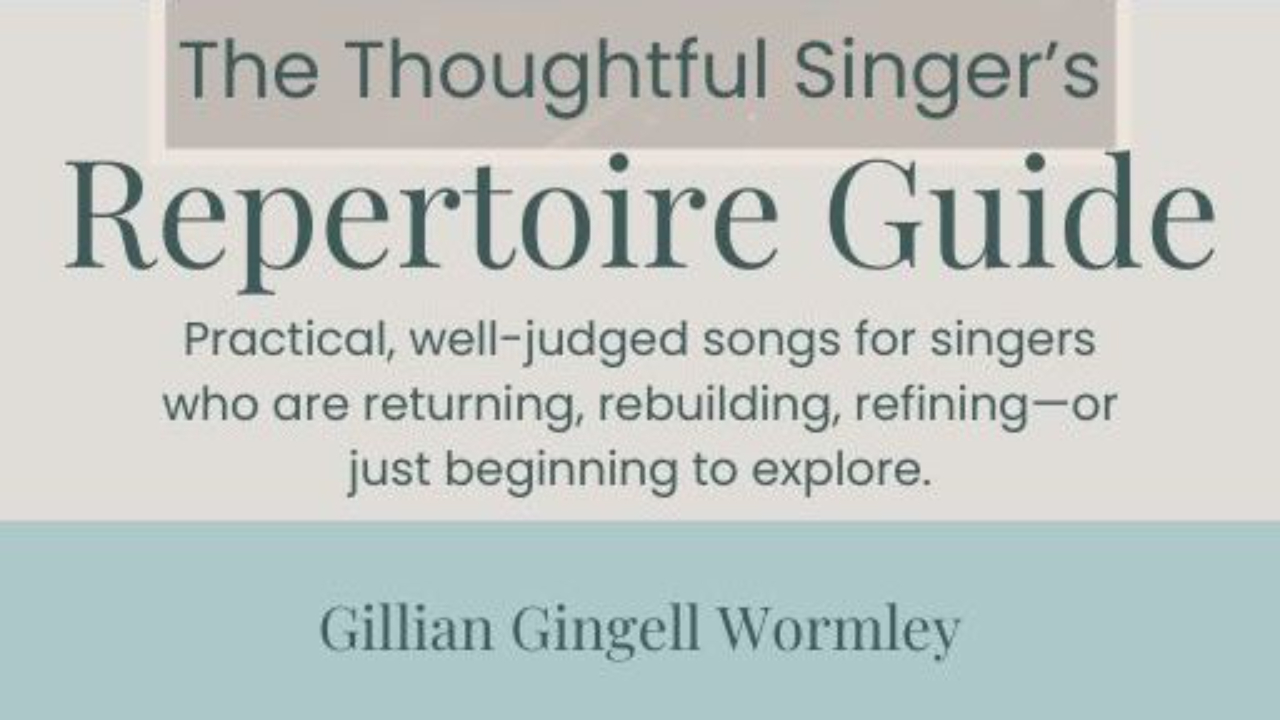Recording Vocals at Home: the basics

Last month, we introduced a NEW virtual workshop event into The Learning Curve for singers. Two sessions hosted jointly by myself and Ryan Walker, audio/tech coach here at The Voice School. Intentions of the workshop were to provide hands-on, informative guidance in terms of what constitutes a good basic recording set-up, grasping best practices when doing so at home on a realistic budget.
The idea developed from the need and desire for continued music-making and connection during these restrictive and isolating COVID-19 times. Singers need to continue using their voice, to keep the instrument in fine fettle - and in seeking to do that, technology repeatedly came to our rescue to make blending voices for ensemble singing a possibility.
As such, fun vocal work/projects we’ve been pursuing within The Voice School Hub since April 2020 using and sharing recorded vocal MP3 and WAV files have given rise to many FAQs along the way and a natural curiosity in understanding more to achieve better results developed, and that's what the workshop weekend was all about. We put all those queries, all those FAQs, into the mix and worked to deliver answers and achieve results. Some typical concerns:
- Is it possible to record audio using Bluetooth? It’s possible, but not advised. Any kind of wireless system has lag issues, where the signal takes time to beam to its receiver (whatever that may be). In our case, using Apple AirPods for example is a handy thing for simple Zoom calls but creates a weaker, lagged signal when used to record audio; the playback you will hear will not be as you sing it and therefore very distracting! The world's most high-end recording studios wouldn’t use Bluetooth and neither should we!
- Is the microphone built into my phone okay to use? If you’ve downloaded an app to use on your phone to record audio, you’ll need to invest in a separate microphone that you can plug into your phone to record with. The built-in mic in your phone will be designed to translate a spoken voice, not someone singing. It could very well clip the sound or just compress the audio so well that no matter how well you sing, your best take will sound weak and distant. There are plenty of great microphones on the market, made to plug into your smartphone that will serve your singing endeavours well.
Tap this link to learn more about what we have to say about those basics. It's a YouTube video about 18 mins or so long. Useful if as a classical singer, you're a beginner in terms of getting to grips with this thing called 'tech' and terms like 'gear'.

Of course, normally classical singers rarely have to think about such things as tech or consider the choice of 'gear' for one's home recording studio. Whilst all workshop attendees were keen to learn, I counted myself as one of those who felt more than underlying insecurity. Give me a piano, an accompanist, and a good acoustic and I'm normally good to go! However, needs must, etc.
Reactions within our private Recording Vocals at Home Facebook group, where we shared links and photographs and feedback from each day's work have been extremely encouraging and very exciting. I think we all enjoyed being put in a position of more freedom and given the knowledge to get on with the job of making recordings but with improved results:

And, it's interesting how we were able to bend the tech to the 'classical' way:

I may well have to return to this blog post and keep 'tweaking' the outcomes and experiences post-workshop. We covered such a lot, so much information - and all such FUN! My thanks to Sue and Sophie for their permission to share their comments and photos

So, there we have it, for now. There will be more workshops like this one in due course. If you're interested in learning more, come and join The Voice School Hub, where we tend to hang out - it's free to join.
If you'd like to know more, especially as we develop the companion RVAH online course, please do register your interest HERE. We'll keep you in the loop.
A little extra info: Ryan and I are both members of the Incorporated Society of Musicians - but our music scenes are very different! I am looking forward to the integration of our thinking and knowledge base as musicians. You may know about me and my Little Soprano business, but here is a little bit more about Ryan … (apart from being my son ...)
Ryan Walker is a songwriter and musician, gigging and teaching in Bristol UK.
Ryan graduated from Dartington College of Arts in 2005 and since then has built a longstanding teaching practice, working in primary schools and privately.
Ryan’s band The Rin Tins was formed in 2011 and has toured Europe and recorded extensively.

Curious about singing basics? Let's get you started with the right learning tools.
Download my free need-to-know vocal essentials guide for singers, vocal technique principles simply explained.







